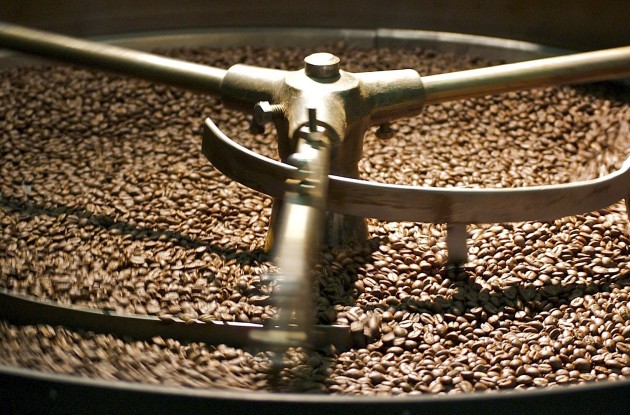
Coffee Roasting at Terroir (Photo: Susanna Bolle)
Boston has never had a reputation as much of a coffee town–at least not one on par with coffee meccas like Seattle or Portland, Oregon. But all that’s changing.
Over the past two years a half dozen new cafés and coffee shops have opened in and around town, offering well-pulled espressos, delicately frothed cappuccinos and coffees brewed specially by the cup. It’s serious business, where coffee making is approached with the reverence of high art and the rigor of hard science.
Two local specialty roasters are at the forefront of this coffee cultural revolution: Acton’s Terroir and Arlington’s Barismo. Both roasters offer an assortment of absolutely beautiful coffees, and both have an almost evangelical commitment to improving the quality of coffee from sourcing the best beans from around the world to testing and developing the best brewing methods.
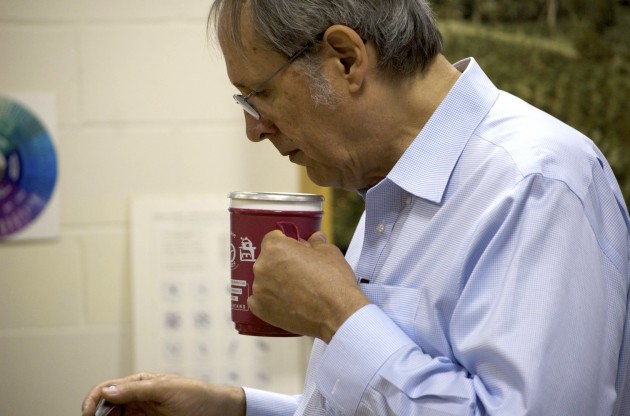
George Howell of Terroir Coffee (Photo: Susanna Bolle)
Of the two, Terroir is the larger and more established roaster. The company was founded by George Howell, who is a legendary figure in coffee circles. In the early 1970s, he pretty much singlehandedly brought specialty coffee to the East Coast, when he opened the Coffee Connection in Harvard Square. For almost 20 years, it was the epicenter of fine coffee in the northeast, until it was bought out by Starbucks in the early 1990s. After several years working directly with coffee farmers and helping develop the influential Cup of Excellence program, he started Terroir in 2004.
The roastery is located in a medium-sized warehouse in a rural part of Acton. There’s no retail shop or café here. Howell has actually been out of the drink-making business for years, but that’s about to change. He recently bought the Taste coffee shop in Newton and plans to open a flagship Terroir café in Boston or Cambridge in 2011. This is big news. Coffee lovers, stay tuned.
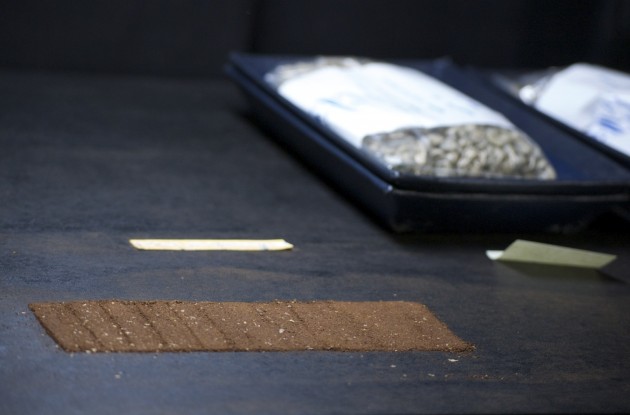
Measuring Coffee at Terroir (Photo: Susanna Bolle)
When I visited the warehouse, Howell was in the midst of a cupping — the rough, coffee equivalent of a wine tasting. It’s an intense process as you evaluate the coffee in various states from dry grounds to brewed coffee. In this case Howell, along with his daughter Jenny, who is the director of coffee sourcing and development at Terroir, were tasting a group of coffees from Nicaragua. The objective of this cupping was to select the very best of what were already all very good beans (and all very similar in flavor profile) to offer to Terroir customers.
Zeroing in on the small differences that separate a good coffee from a great one is an exhaustive and exhausting process that lasts almost an hour. “It requires a lot of taste bud endurance,” Howell admitted with a laugh. But it’s clear as he sampled the various coffees, making notes and winnowing them down to a few choice favorites, that is was a labor that he loved intensely. Would one of the coffees that we cupped that day turn out to be as exquisite as Terroir’s Mamuto or La Esmeralda beans (two of my favorite Terroir offerings)? As I cupped along with him, I couldn’t necessarily have homed in on the winner. But Howell, who is regarded as one of the best cuppers in the business, almost certainly could.
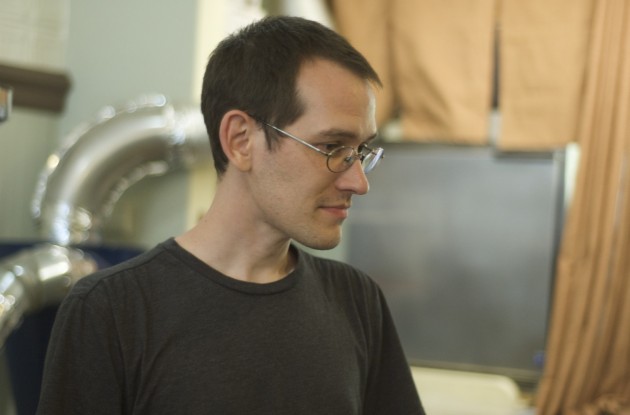
Jaime Van Schyndel of Barismo (Photo: Susanna Bolle)
Over at Barismo the atmosphere is a little different. It’s not a café per se (there are no seats), but you can get a carefully wrought shot of espresso or a cup of coffee prepared in a variety of ways. With all the coffee-making equipment, ranging from syphons to pour over kits, and the intense focus on procedure and detail, the shop at first seems to have an almost lab-like feel to it. But the people at Barismo are anything but clinical or detached in their approach to coffee. In fact, they are unflinchingly passionate about it.
Co-owner Jaime Van Schyndel waxed positively rhapsodic about the beauty of the “chk-chk-chk” sound of a coffee grinder and winced, as if in pain, at the thought of poorly frothed, scorched milk. They are serious about their coffee at Barismo, but they’re also endearingly enthusiastic and sincere. They sweat every detail, from the beans themselves to the roasting process to the brewing methods used. There are very few aspects of the coffee-making process that have not been worked through to the nth degree. Wondering about water temperature or the proper grind for wood neck? You’ll find an answer here. Getting a cup of coffee or purchasing a bag of beans at Barismo is an educational experience in itself.
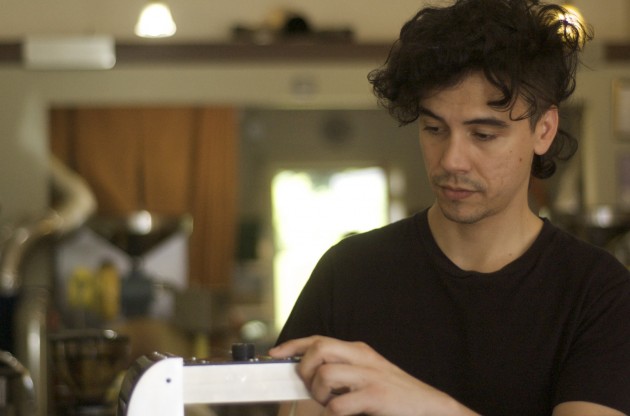
Logan Hudson of Barismo (Photo: Susanna Bolle)
This obsessiveness can be daunting, and perhaps even off-putting to some people. I’ll admit, as I made a groggy, early morning attempt at a pour over, after the first time I visited Barismo, I felt almost unworthy of the beans and the modest kit I’d purchased. (You can watch a video of Chris van Schyndel of Barismo doing a woodneck pour over to see how it’s done.) But I got over it. Ultimately, the proof of the coffee is in the tasting. And whether it’s an espresso, a pour over, or even an iced coffee (I usually can’t stomach cold coffee, but Barismo’s has a surprising sweetness to it), the attention to detail and exacting standards yield some extraordinary coffee.
Of course, you need to be mindful of coffee’s stimulating properties, especially when drinking such exemplary cups. Obvious? Yes, but I re-learned this the hard way. On the same day that I cupped those beautiful Nicaraguan coffees at Terroir, I visited Barismo and, of course, drank still more coffee. A lot more coffee. Not a good idea. It’s a testament to both roasters that, though I was wild-eyed and giddy by the end of the day, I didn’t regret one sip.
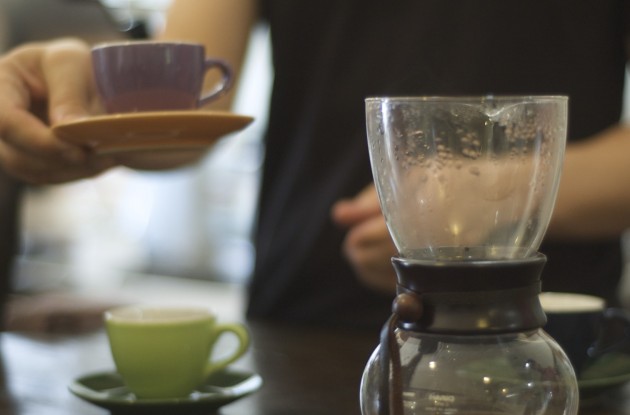
Just one more cup (Photo: Susanna Bolle)

Pingback: Local Roasters | Public Radio Kitchen | Blogs | WBUR
Thanks for sharing a bit about yourself and your journey with us!